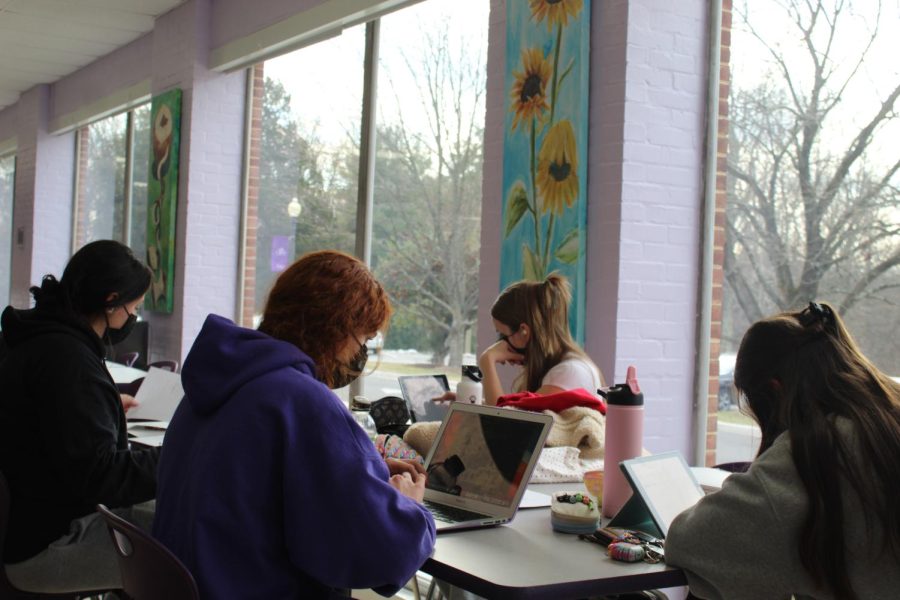Where’s Your Motivation?
Photo by Meg Stone
LOTAs work hard in the Student Commons during their free period. Students found it difficult to stay motivated when they were alone, so they worked together to study. Being in each other’s company boosts morale and helps students focus.
As the Covid pandemic grew more concerning, hardworking LOTAs and teachers were forced to move school from classroom to bedroom. Without easy communication between teachers and friends, and with countless hours at home, it soon became difficult for students to keep up their motivation and they suffered burnout.
Tartans found that with the pandemic interrupting their normal schedules, they struggled to go about their daily tasks.
“During virtual learning, it was definitely hard to sit up in bed every morning to attend an 8am class,” student Megan Steele commented, chuckling at the memory.
The sudden drop in student motivation was not lost on faculty members, and they grew concerned for the mental health of their students.
“As educators, we want students to develop key competencies,” school counselor Julie Ritter stated. “But we must also relate as human beings and virtual learning just makes it more challenging and therefore stressful.”
Even teachers had a hard time adjusting to life in a pandemic.
“I’ve had to come up with a variety of approaches to what once was more familiar,” Ritter noted. “There are moments where this is kind of exciting as I’m learning something new, but there are moments where it’s challenging and frustrating too.”
Once students and faculty could safely return to school with hybrid learning and, eventually, fully in-person classes, they found it difficult to get back to their original amount of motivation, especially with the added stress of college applications.
“Now, as a senior, motivation is very hard to find. I’m usually motivated by time…also food,” Steele admitted.
Students are also driven by the watchful eyes of their family to keep up their good work ethic.
“My parents really like to check my grades on PowerSchool,” Steele remarked. “Knowing that they could see a bad grade was motivation enough for me to keep going.”
After being home with their families and not spending time with their peers, LOTAs noticed their social motivation had also dropped significantly. It was especially difficult for the freshman class, with their first year at a new school spent on Google Meet.
“It was very weird,” sophomore Esme Dorsey pointed out. “I feel like I’m not super connected to the people that I knew in middle school, and I feel like I haven’t been able to make a lot of connections here now because of the pandemic. It’s taken a toll on me.”
Even students who had been attending Holy Cross and who had a few years to create relationships struggled in their social life coming out of the pandemic.
“My social skills have dipped so very much from the pandemic,” Steele confessed. “Seeing people through screens is not the same as seeing people in real life. I think we’ve all come to realize that.”
Nevertheless, Tartans were resilient. Even when they suffered burnout from constant uncertainty and spending twice as many hours on the computer, they continued to work to build back their pre-pandemic motivation.
“I just powered through, knowing that the pandemic wasn’t going to be around forever, and that if I can get through this year, I can pretty much do a lot of things,” Steele concluded confidently. “As the author Glennon Doyle says, ‘you can do hard things,’ and I believe that is very true.”

Meg Stone is a junior at AHC and is excited to join the reporting team for the first time. Meg is involved in all things performing arts, including being...


